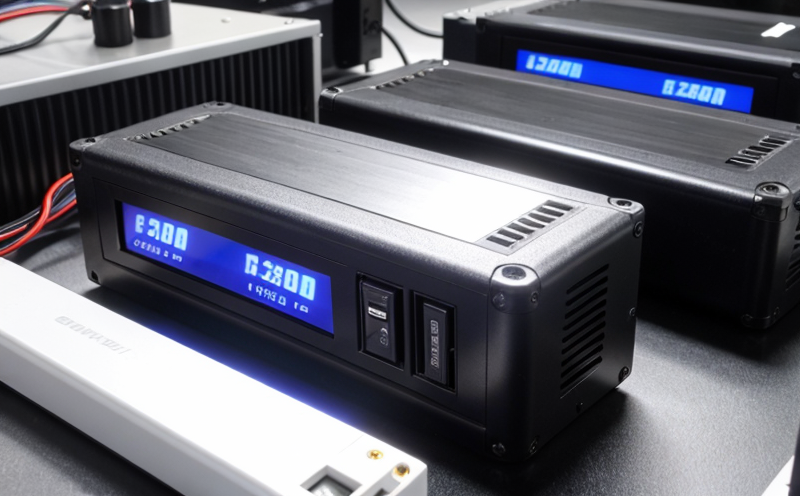ANSI C18.1M Part 1 Portable Primary Battery Performance Testing
The ANSI C18.1M Part 1 standard is one of the key protocols used to evaluate the performance characteristics of portable primary batteries, including alkaline and zinc-based cells. This standard ensures that manufacturers meet stringent quality and safety benchmarks, which are critical for industries such as consumer electronics, medical devices, and emergency lighting.
Testing under ANSI C18.1M Part 1 involves a series of rigorous procedures designed to assess various performance metrics including capacity, internal resistance, open circuit voltage, and self-discharge rate. These tests help ensure that the batteries meet industry standards and can be relied upon for consistent performance in real-world applications.
The process typically begins with careful preparation of the test specimens. This includes ensuring that each battery is stored under specified conditions to prevent any bias affecting the test results. Once prepared, the batteries are subjected to a range of tests aimed at simulating real-world conditions they may encounter during use. For instance, testing for capacity involves discharging the battery to specific voltage levels and measuring the amount of energy released.
Internal resistance is another crucial parameter measured through specialized equipment that can accurately gauge how much internal resistance affects the overall performance of the battery. Open circuit voltage tests check the resting state voltage before any load is applied, providing insights into initial performance. Self-discharge rate tests observe the loss in capacity over a specific period when the battery remains unused.
These tests are not only vital for ensuring product quality but also play a significant role in compliance with international regulations and standards. ANSI C18.1M Part 1 is widely recognized by regulatory bodies, making it essential for manufacturers to meet these requirements to ensure their products can be sold globally without issues.
The results of these tests are meticulously recorded and analyzed to provide a comprehensive report on the battery’s performance characteristics. This information helps quality managers and compliance officers make informed decisions regarding product improvement and market entry strategies. It also aids R&D engineers in refining designs for better performance and reliability, while procurement teams can use this data to select high-quality suppliers.
By adhering to ANSI C18.1M Part 1 standards, manufacturers not only enhance the safety and efficiency of their products but also contribute towards reducing environmental impact by ensuring longer-lasting batteries that are less prone to premature failure.
Industry Applications
| Application Area | Description |
|---|---|
| Consumer Electronics | Batteries used in portable devices like smartphones, tablets, and digital cameras are rigorously tested to ensure they meet the stringent power demands of these gadgets. |
| Medical Devices | Portable medical equipment such as defibrillators and blood glucose monitors require reliable batteries for critical applications where performance cannot be compromised. |
| Emergency Lighting | Batteries used in flashlights, lanterns, and other emergency lighting devices must provide consistent power under various conditions to ensure they function when needed most. |
- Consumer Electronics: Ensures that portable gadgets operate efficiently without frequent recharging.
- Medical Devices: Critical for ensuring medical equipment is always ready and reliable.
- Emergency Lighting: Vital for providing illumination in emergencies, where performance must be consistent and dependable.
Quality and Reliability Assurance
The testing protocols outlined in ANSI C18.1M Part 1 are designed to ensure that each battery meets the highest standards of quality and reliability. By adhering strictly to these guidelines, laboratories can provide clients with accurate assessments of their products' performance characteristics.
Quality assurance (QA) measures focus on maintaining consistent product quality throughout the manufacturing process. This includes not only testing during production but also continuous monitoring of incoming materials and finished goods. Reliability assurance ensures that once a product reaches market, it continues to perform as expected under various conditions over its lifecycle.
For manufacturers, these tests are essential for identifying potential issues early in the development cycle so they can be addressed before products reach consumers. This proactive approach helps prevent costly recalls and enhances brand reputation by delivering high-quality products that meet or exceed customer expectations.
The detailed reports generated from ANSI C18.1M Part 1 testing provide valuable insights into a battery's performance characteristics. These reports serve as crucial documents for regulatory compliance, product certification, and internal quality control. They also help guide ongoing research and development efforts aimed at improving future generations of batteries.
International Acceptance and Recognition
The ANSI C18.1M Part 1 standard enjoys widespread acceptance across the globe due to its rigorous testing procedures and comprehensive coverage of key performance metrics. Many countries around the world recognize this standard as a benchmark for portable primary battery quality.
In North America, where ANSI standards are widely adopted, compliance with ANSI C18.1M Part 1 is often a prerequisite for product certification. Similarly, in Europe, adherence to equivalent European standards like IEC 60087-2 would be essential for market entry.
The standard's global recognition makes it easier for companies operating internationally to ensure consistent quality across different markets. By meeting these international standards, manufacturers can reduce barriers to trade and enhance their competitive position in the global marketplace.
Regulatory bodies worldwide increasingly rely on ANSI C18.1M Part 1 as a foundation for developing local regulations. This standard's credibility stems from its rigorous testing protocols, which are designed to ensure that batteries meet stringent quality and safety benchmarks. Its acceptance by major international organizations further solidifies its status as an industry leader.





